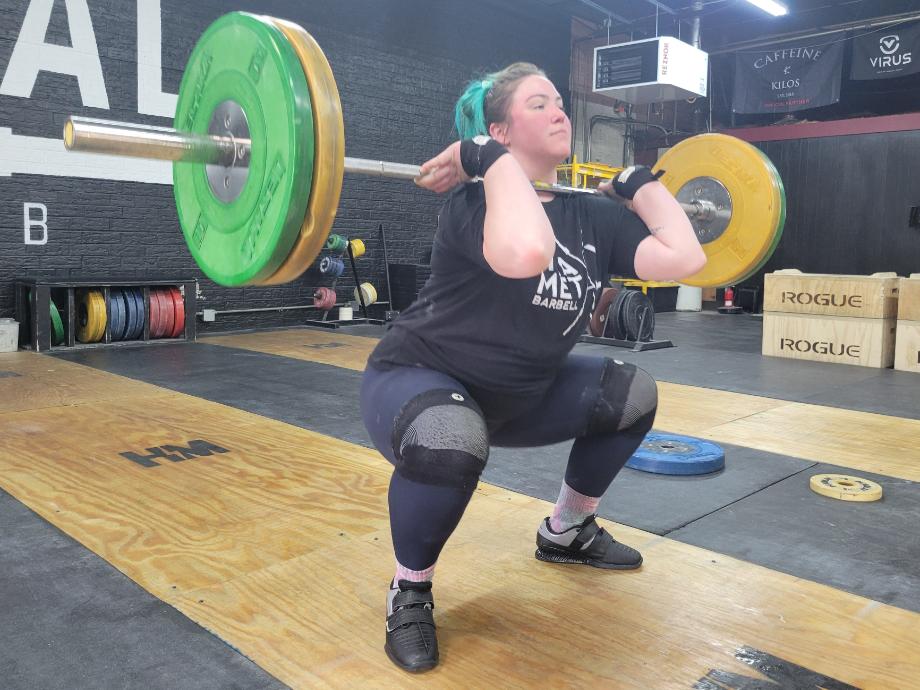We test and review fitness products based on an independent, multi-point methodology. If you use our links to purchase something, we may earn a commission. Read our disclosures.
Let’s face it: The best weightlifting shoes are expensive. As an Olympian who has competed in weightlifting for the past 25 years, I could say I’ve become desensitized to it. Still, it stings to drop a lot of money on a highly specialized shoe that I won’t wear outside the gym or competition platform.
Take, for example, a favorite lifting shoe among Olympic weightlifters—the Nike Romaleos 4, which is $200. Other top brands cost even more. It’s hard for beginners to spend so much on a shoe before figuring out if they like a training method first.
Fortunately, there are budget-friendly options available, although they’re rarely under $100. However, a shoe recently came out on the market that looks eerily similar to the Romaleos—but at about a third of the price. In this kcross Weightlifting Shoes review, we’ll take a deeper look into this shoe, and see how it stacks up to high-end weightlifting shoes. Ultimately, we’ll determine if this shoe is the real deal, or not worth its budget price.
Dozens of Gym Shoes Tested
In addition to the kcross lifting shoes, we’ve tested dozens of training shoes—over 80, to be more specific. From the best running shoes, minimalist shoes, cross-training shoes, and weightlifting shoes, we’ve had our hands on all top brands in the market to determine which ones deserve your hard-earned cash.
Our team doesn’t shy away from honest feedback. Composed of certified personal trainers, competitive athletes, CrossFit Level 1 trainers, and weightlifting coaches, we know the ins and outs of the fitness industry, and what makes good weightlifting shoes…or dumbbells, squat racks, and more.
I was going to test out the kcross lifters myself, but due to limited shoe sizes (more on that later), I had my wife, Emelie Wilkes, USAW-L1, test them. Having competed in Olympic weightlifting for the last 12 years and nabbing multiple national-level medals, she’s no stranger to the sport. She’s even competed internationally. Emelie tried the lifting shoes over the past few weeks, noting aspects and features of the shoes, such as:
- Appearance and design
- Construction and durability
- Stability
- Versatility
- Adjustments and comfort
- Overall value
She rated each of these categories a score between 1 and 5 to determine the final rating of the kcross Weighlifting Shoes.
kcross Weightlifting Shoes
kcross Weightlifting Shoes
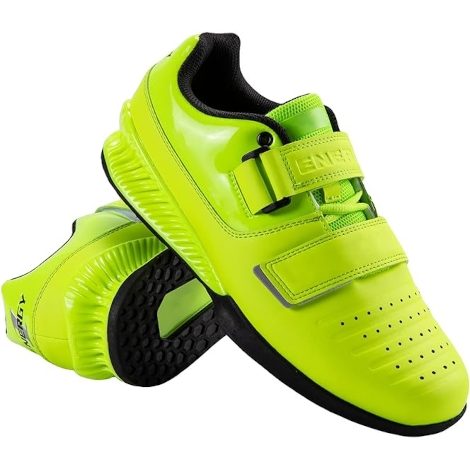
Product Highlights
- Budget-friendly weightlifting shoe
- Sturdy outsole
- Nylon upper
- 20-mm heel-toe drop
- Dual Velcro straps
Pros & Cons
Pros
- Inexpensive
- Quality heel and outsole
- 20-mm heel-toe drop
- Stable performance
Cons
- Limited sizes
- No warranty
- Customers report a narrow toe box
Bottom Line
The kcross Weightlifting Shoes are a durable pair of lifting shoes with a very low price point for lifting shoes. For $70, the heel is extremely similar to higher end shoes like the Nike Romaleos. Although sizes are limited and the toe box is reported as being narrow, these are a solid pair of lifting shoes.
A Quick Look at the kcross Weightlifting Shoes
There’s not a lot of information on the internet on kcross as a company, mostly since it seems to operate entirely from an Amazon storefront. From what I can gather, the company imports products from China and specializes in athletic gear like wrist wraps, lifting belts, and outdoor hiking gear.
Made for squats or Olympic lifting, the kcross shoes have a stable base with a raised heel to help better position athletes into a more upright squat position. They’re also marketed as a deadlift shoe, but the heel-to-toe drop of 20 millimeters might be a bit higher than people may want for deadlift shoes or cross-trainers. Still, they’ll work great as squat shoes or lifters.
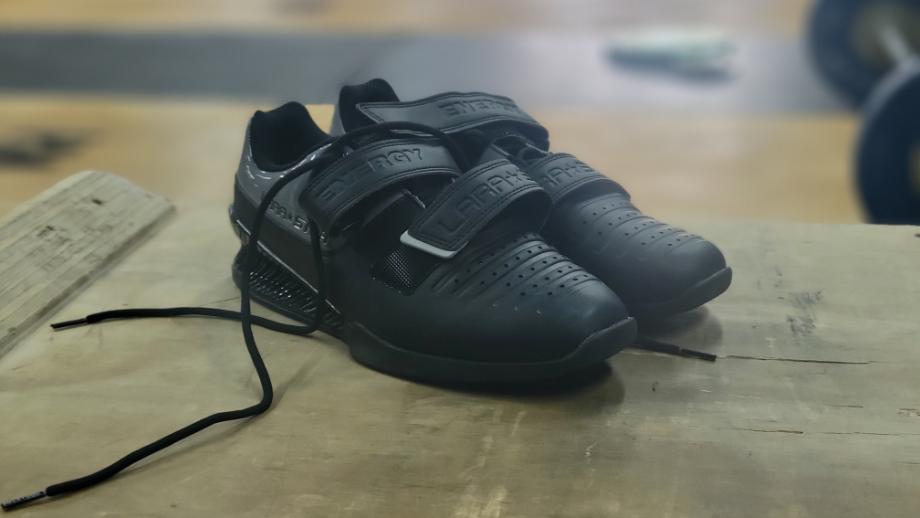
The kcross Weightlifting Shoes are reminiscent of the Nike Romaleos…actually, they look surprisingly similar. I own the Nike Romaleos 4 weightlifting shoes, and I can hardly tell a difference between the outsoles on the shoes. The upper material is less breathable, but it still reminds me of the material used in older models of the Romaleos. I don’t want to accuse these shoes of being knock-offs that are made cheaper and therefore sold at a discounted rate, but they have a striking resemblance to the Nike shoes.
Regardless of how these shoes are made, though, they have the same solid stability as the Romaleos, but at a fraction of the price. The kcross weightlifting shoes cost $70 on Amazon, while the Romaleos cost $200.
Before You Buy
- Although the shoe has great value, sizes are much more limited than other brands. Sizes only range from 6.5 to 12 in men’s sizing, or women’s 8 to 13.5.
- Branding is a little odd on these shoes as well. Although manufactured by kcross, the shoes are labeled across the top strap “1 Energy,” which is also marketed on the Amazon product page. However, the bottom sole is also marked “Lara Star,” which is another Chinese brand on Amazon.
Are the kcross Weightlifting Shoes Worth It?
The kcross Weightlifting Shoes are made with quality materials and have stability that rivals top weightlifting shoes—for the low price of $70. This isn’t only well under the $200 or more of top shoes like the Nike Romaleos, adidas Adipower III, or the Reebok Legacy Lifter 3s; the price point also undercuts most budget brands of lifting shoes.
The Reebok Lifter PR 3 shoes, for example, are $110. The Nike Savaleos are also considered budget-priced, but are still $125. Turns out that $70 is the lowest price for a lifting shoe we’ve tested—aside from the Converse Chuck Taylor All-Stars (a better choice for deadlifts).
If you’re looking for a high-quality lifting shoe for heavy squats, clean and jerks, and snatches, these lifting shoes have killer value for their price, leading Emelie to rate the overall value of the kcross shoes a 5 out of 5. They won’t be ideal for everyone, since they won’t have the versatility of other lifting shoes, and they won’t be great if you only want to deadlift. However, if you’re looking for a weightlifting shoe with a higher heel, this is a fantastic option.
Great for:
- Olympic weightlifting and squats
- People looking for budget-friendly gym shoes
- Athletes with limited ankle mobility
Not recommended for:
- Athletes with smaller or larger shoe sizes
- Powerlifters wanting a dedicated deadlift shoe
- Athletes with wide feet needing a wider toe box
kcross Weightlifting Shoes Specs
| Price | $69.99 |
| Heel-to-toe drop | 20 mm |
| Size range | Men’s 6.5-12, Women’s 8-13.5 |
| Upper | Nylon |
| Midsole | TPU heel |
| Outsole | Rubber tread |
| Color options | Meadow Green, Obsidian Black, Coral Orange, Ivory White |
Using the kcross Weightlifting Shoes
My wife and competitive weightlifter Emelie Wilkes, USAW-L1, used the kcross Weightlifting Shoes for close to a month, in over a dozen training sessions. Being an Olympic weightlifter herself, she used the shoes for the classic lifts—the snatch and the clean and jerk—as well as pulls, barbell squats, and presses.
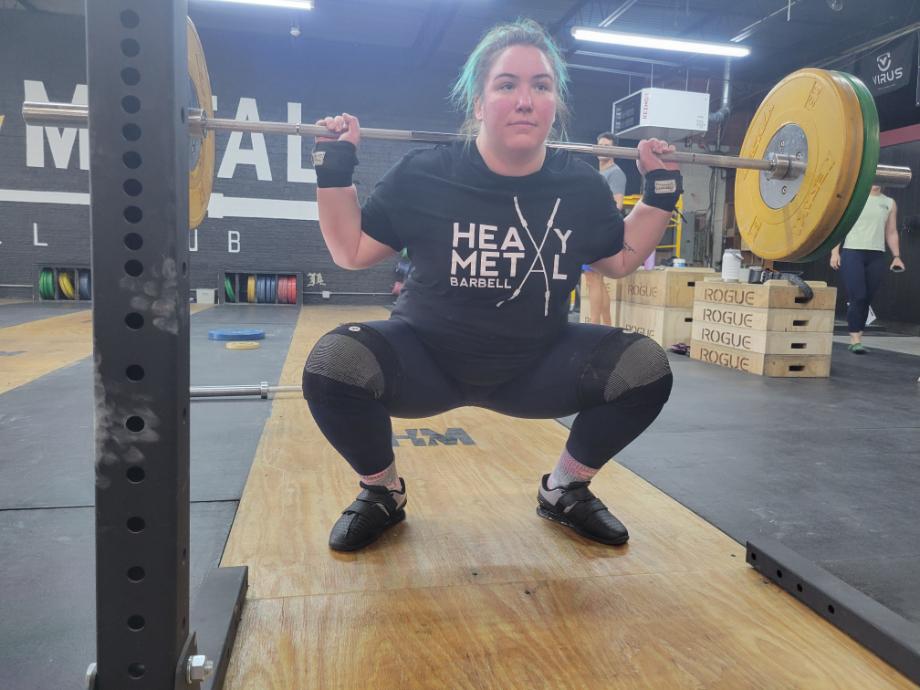
Her immediate thought on the shoes is that they’re incredibly stable, leading her to rate them a 5 out of 5 for stability and performance. “The hard sole is pretty close to high-end lifting shoes, so these are very solid shoes,” she explains. There are also Velcro straps across the midfoot and forefoot to help secure your shoe beyond the typical laces.
The heel height of 20 millimeters is a touch lower than what she is used to. She normally wears the Reebok Legacy Lifters, which have an elevated heel of 22 millimeters. It took her a few sessions to feel comfortable in them during more technical lifts like snatches and overhead squats. (I had the same issue when I tested out the Nike Savaleos Weightlifting Shoes.)
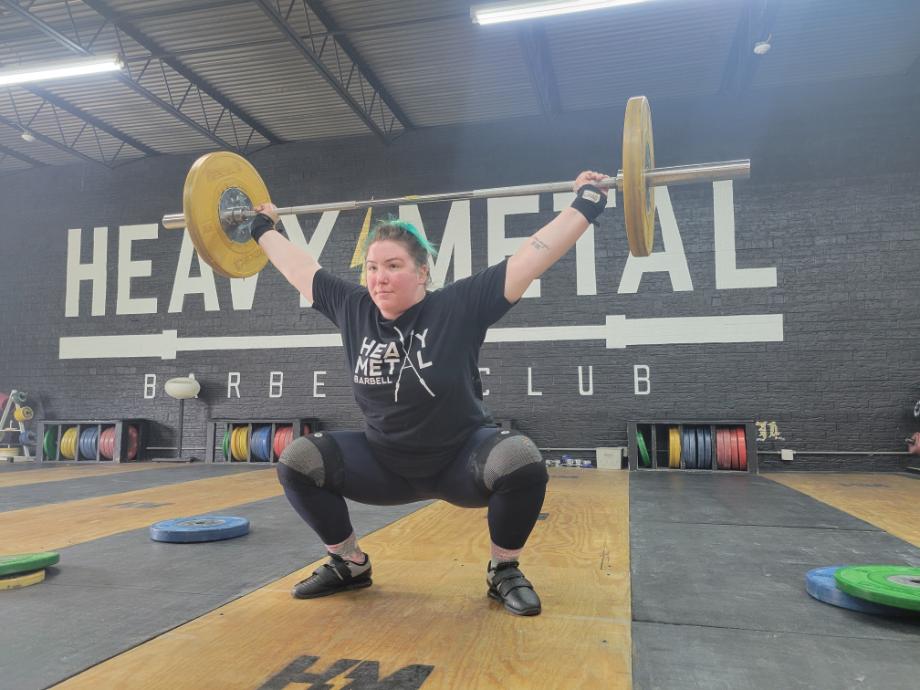
This is a pretty common heel height for Olympic lifting, though, so most lifters should feel comfortable in them. Just know if you’re changing to shoes that have a different heel height, there will be a learning curve at first.
Construction and Durability
These shoes are built solidly, leading Emelie to rate their construction and durability a 4.5 out of 5. Because she’s only had and used the shoes for a few weeks at this point, their longevity hasn’t been put to the test yet. But with materials similar to top lifting shoes, Emelie feels they’ll last pretty well—especially since the sole consists of TPU, a solid plastic-rubber hybrid material that gives the shoe such a solid foundation.
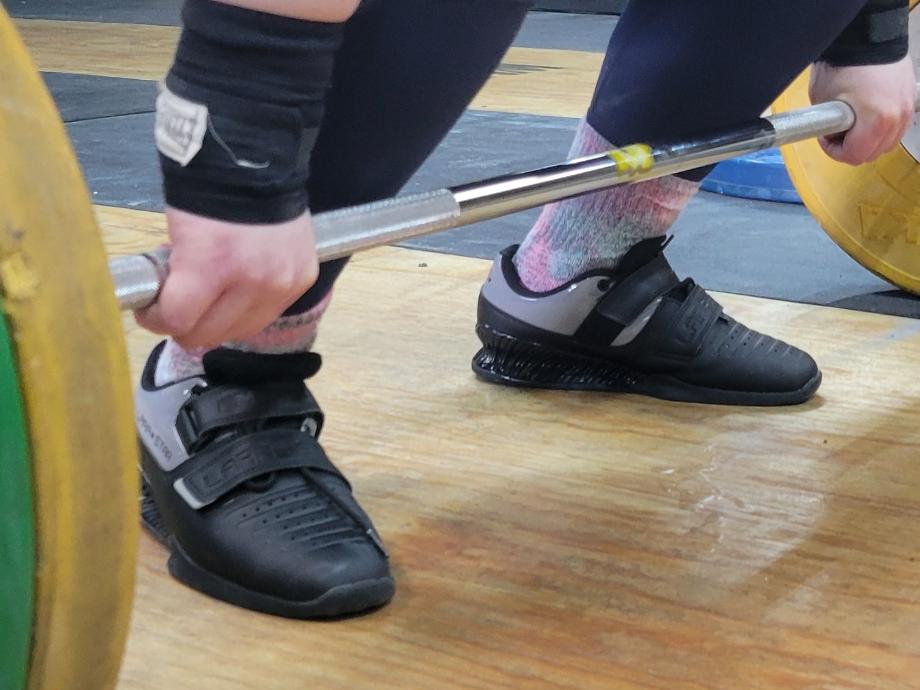
“The upper is a nylon, which seems fairly durable, but this is also the kind of material that will show some wear and tear over time,” Emelie explains. “The sole is solid though; those’ll last through a war.”
The upper isn’t as breathable as the mesh used on the latest Romaleos, but the breathability is still there. The rubber outsole provides enough tread to keep you from sliding around the floor with heavy weights, no matter the type of home gym flooring.
Appearance and Design
The shoes come in four different colorways, and Emelie gives the appearance and design a 4 out of 5. Most of the color options are bright, common gym shoe options. For those who prefer a more reserved shoe, the kcross shoes come in Obsidian Black, which is black and gray (and also the shoes that Emelie went with).
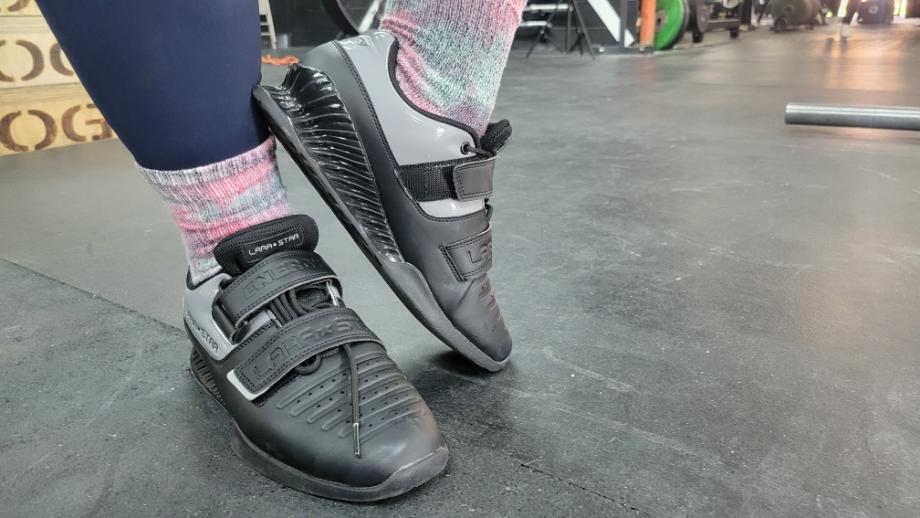
One thing that bothered Emelie about the design was the multiple branding logos on the shoes. It was a little off-putting, since it made her feel like these shoes weren’t legitimate. After using them, they feel like the real deal, but I think the branding might throw some people off initially.
Versatility
These aren’t made to be cross-training shoes, so for those looking for some shoes for cardio workouts and metcons, you might want to try other options. There is the bare minimum amount of cushioning inside the shoe, which means there’s far less responsiveness than top running shoes and most cross-trainers, too. The shoe does have an insole that can help with that, but it’s still minimal.
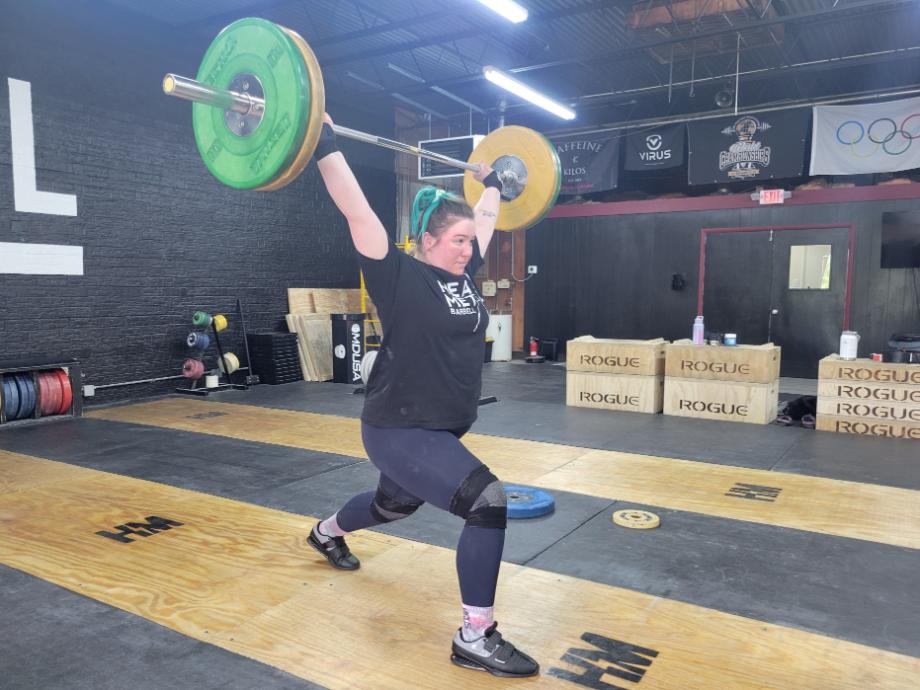
Emelie still rates the versatility of the shoes a 4 out of 5, though, because you’ll still be able to do most of your strength training in these shoes. “They provide a solid base even for heavy lifting you forget you need a base for, like the bench press,” she says. These shoes can work for deadlifts, although powerlifters may not want the raised heel. Just don’t run or jump in them.
Adjustments and Comfort
In addition to the midfoot and forefoot straps, the kcross Weightlifting Shoes have laces that can secure the shoes. “They’re not walking shoes,” Emelie says, “but for lifting shoes, these are pretty comfortable.” She rates the adjustability and comfort a 4 out of 5.
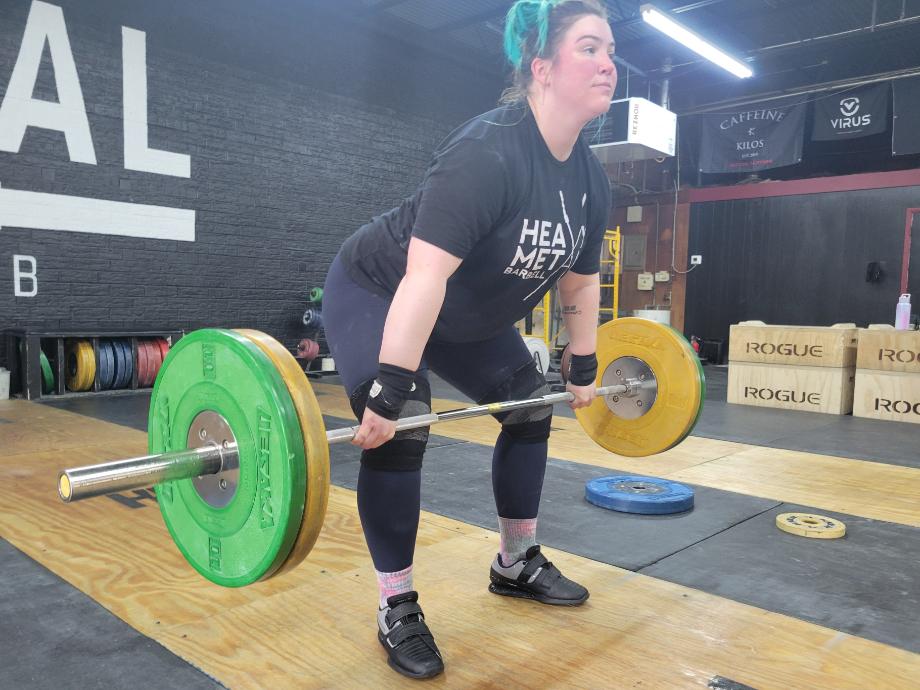
The main thing that doesn’t make this a perfect score is that the shoes have limited sizes, only going up to a men’s size 12 (13.5 in women’s sizing). Additionally, for people with wide feet, the toe box may be too narrow. Because of that, kcross suggests going up a half-size or whole-size to fit your feet properly. The limited sizes really puts a damper on what is a strong and solid shoe for lifting.
RELATED: TYR L-1 Lifters Review
kcross Weightlifting Shoes vs Nike Romaleos 4
Nike Romaleos 4
Nike Romaleos 4
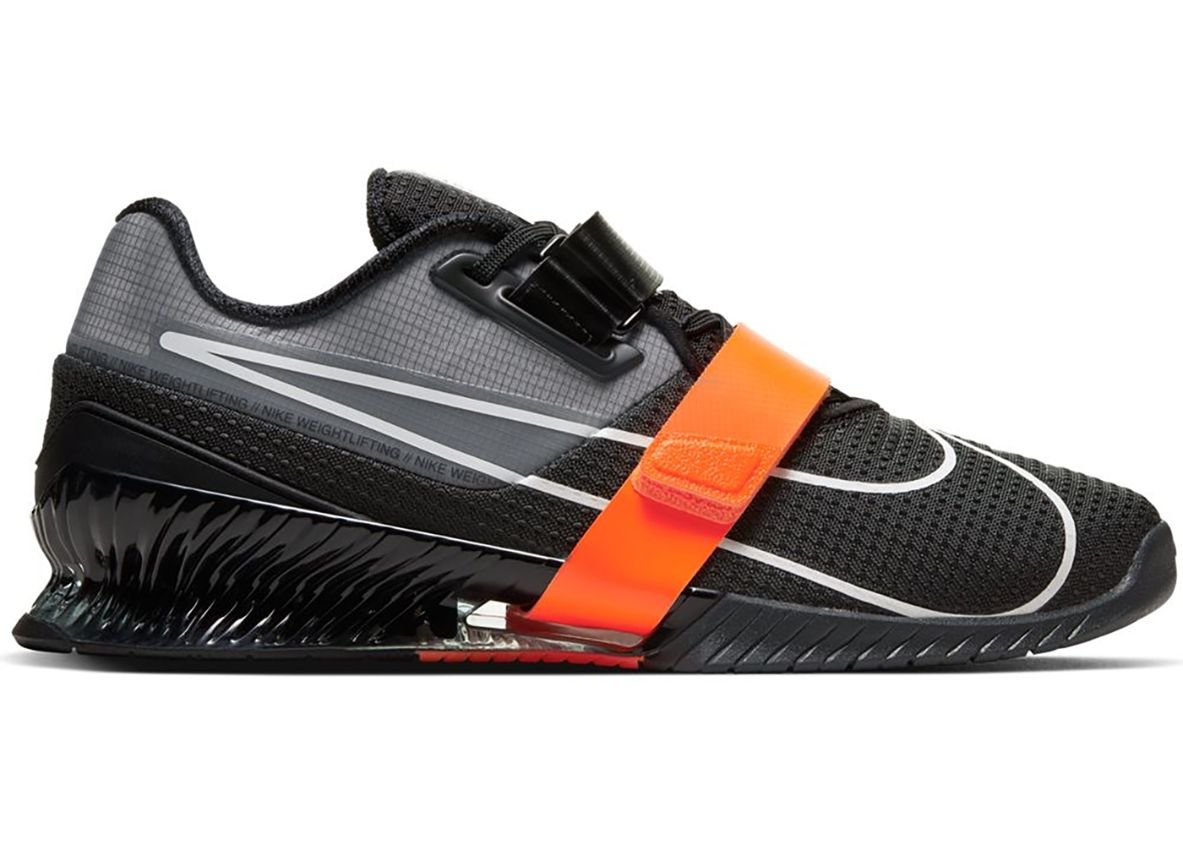
Product Highlights
- Latest iteration in this line of weightlifting shoes
- Blends the breathability of the Romaleos 3 with the sturdy outsole of the Romaleos 2
- 20mm heel drop as well as dual velcro straps
Pros & Cons
Pros
- Incredibly stable platform and midfoot
- Wider toe box than the previous Romaleos
- Heavy and sturdy–I feel like I’m rooted into the ground
Cons
- The laces and straps feel a bit flimsy, but laces can be replaced, and the straps don’t need to do much work if the laces are tied.
- The different materials that are used to make the shoes more breathable also make me wonder how long they will actually last.
- The $200 price will likely limit these shoes to serious athletes.
Bottom Line
The Romaleos 4 were designed to represent the favorable parts of all versions, and I do believe Nike has executed that well. While the price tag of $200 may deter some, this shoe is a great option for those seeking a sturdy, aesthetically pleasing weightlifting shoe.
Since I’ve discussed the similarities between the two shoes, we have to put the Nike Romaleos 4 head-to-head with the kcross Weightlifting Shoes. At first glance, there are some obvious similarities, primarily in the heel. Both shoes have a 20-millimeter heel-toe drop, and have the same material in the heel and outsole—thermoplastic polyurethane (TPU) and rubber tread, respectively.
The upper varies, as the Romaleos have a more breathable mesh, while the kcross lifters have a nylon upper. The major difference, however, is the price. The kcross Weightlifting Shoes are only $70, nearly a third of the price of the Romaleos. It’s wild to have a similar, stable lifting shoe with such a price decrease compared to the popular Romaleos 4s.
The sizing is much more limited than the Romaleos, but if your shoe size fits in the range of the kcross shoes, these are a very good deal. You can read more about the high-end shoes in our Nike Romaleos 4 Weightlifting Shoes review.
| kcross Weightlifting Shoes | Nike Romaleos 4 | |
| Price | $69.99 | $200 |
| Heel-to-toe drop | 20 mm | 20 mm |
| Size range | Men’s 6.5-12, Women’s 8-13.5 | Men’s 3.5-15, Women’s 5-16.5 |
| Upper | Nylon | Breathable mesh |
| Midsole | TPU heel | TPU heel |
| Outsole | Rubber tread | Rubber tread |
| Color options | Meadow Green, Obsidian Black, Coral Orange, Ivory White | Black/Black/White, White/White/Black, Black/Metallic Gold/White/Metallic Gold, White/Bright Crimson/Pink Blast/Black |
Customer Experience
Since the kcross store works entirely from Amazon, you’ll be dealing with Amazon for customer service. Fortunately, Amazon has pretty good policies, earning customer service a 4 out of 5. The shoes have a 30-day return policy with free shipping—on new or unused items—and there are many ways to contact Amazon for questions and help.
For select sizes and color options, you can also try the shoes for 7 days. If you don’t like them, you can return them; if you do like them, then your payment will be processed at the end of the week-long trial.
A word of warning, though: The kcross Weightlifting Shoes do not have a warranty, probably one way that the shoes can sell at such a low price point. If you like the protection of a warranty, you may want to spend a bit more on another shoe.
Ordering the kcross Weightlifting Shoes
You can purchase the kcross Weightlifting Shoes from Amazon, and if you’re an Amazon Prime member, you get free 2-day shipping. If not, shipping costs are calculated at checkout. Financing is also available through Affirm.
Customer Reviews
As of this writing, there are 111 customer reviews for the kcross Weightlifting Shoes on Amazon, with an average score of 4.1 stars out of 5. Many positive reviews are impressed by the stability of the shoes, using them for heavy squats and similar lifts. Others liked the appearance of the shoes, coming in a couple sharp-looking and bright colorways; one review even compared them to older designs of the Nike Romaleos.
The largest complaint of the shoes is their fit. Many people ordered a half-size or size up (including positive reviews), but some customers still complained of a tight fit. If you have wide feet, definitely order up a size, but be ready to exchange the shoes for a larger size to get the right feel of the shoe.
Final Verdict of Our kcross Weightlifting Shoes Review
For less than $70, the kcross Weightlifting Shoes are solid lifting shoes with crazy value. I don’t know if I can emphasize this enough: $70 for a pair of Olympic weightlifting shoes is a very, very good deal. With a wide, stable base and durable materials, this is a solid shoe for most lifters.
That said, sizing is limited, and people with wider feet may struggle at first to find a proper fit. However, these shoes are comparable to some top brands and at a surprisingly low price point. So, if your sizing matches what kcross offers, these shoes are a steal.
Full Rating
kcross Weightlifting Shoes
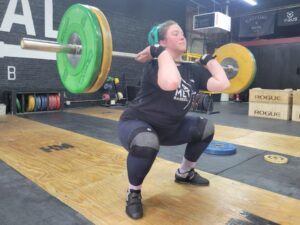
The kcross Weightlifting Shoes are a durable pair of lifting shoes with a very low price point for lifting shoes. For $70, the heel is extremely similar to higher end shoes like the Nike Romaleos. Although sizes are limited and the toe box is reported as being narrow, these are a solid pair of lifting shoes.
Product Brand: kcross
Product Currency: $
Product Price: 69.99
Product In-Stock: InStock
4.33
kcross Weightlifting Shoes: FAQs
Are cross-training shoes good for lifting?
Cross-training shoes can be good for those who follow versatile modes of training—including strength training. Cross-trainers typically have a moderate heel-toe drop and a stable outsole, excellent for grounded lifting in exercises such as front squats, snatches, or clean and jerks.
However, cross-training shoes also maintain a responsive midsole and cushioning. This aids in running and jumping, but can hinder the stability of the shoe. If you’re looking to maximize your strength gains in heavy lifting, a stable shoe specialized for lifting would be your best option.
Do budget lifters like the kcross Weightlifting Shoes rival Nike Romaleos?
The kcross Weightlifting Shoes are very similar to the Nike Romaleos, with the same TPU heel and rubber tread. This makes for an incredibly stable lifting shoe, and for a fraction of the price.
Are the Reebok Legacy Lifter 3s worth it?
The Legacy Lifter 3 is a solid lifting shoe. With its heel-to-toe drop of 22 millimeters, it’s ideal for athletes who prefer a higher raised heel. The lifters feature the Reebok Pump, which is supposed to aid in securing your foot in the shoe. However, as stated in our Reebok Legacy Lifter 3 review, the midfoot strap does a better job of keeping your foot grounded. That said, the shoe is still an excellent choice for lifters looking for a dedicated shoe for squatting and Olympic lifting.
Further reading

Looking for a meal delivery service specially designed for your little ones? Find out if this one is right for you with our Little Spoon reviews! Read more
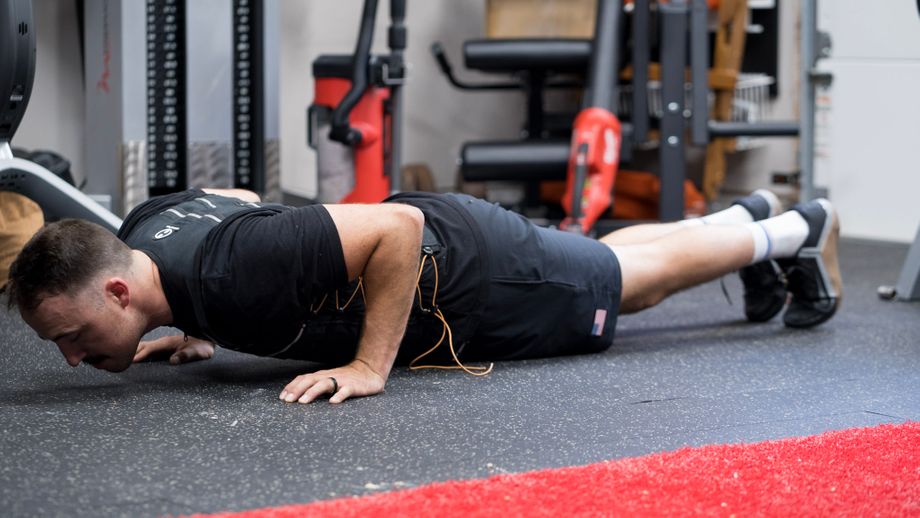
These 6 exercises will give you an effective upper body workout at home. Read more
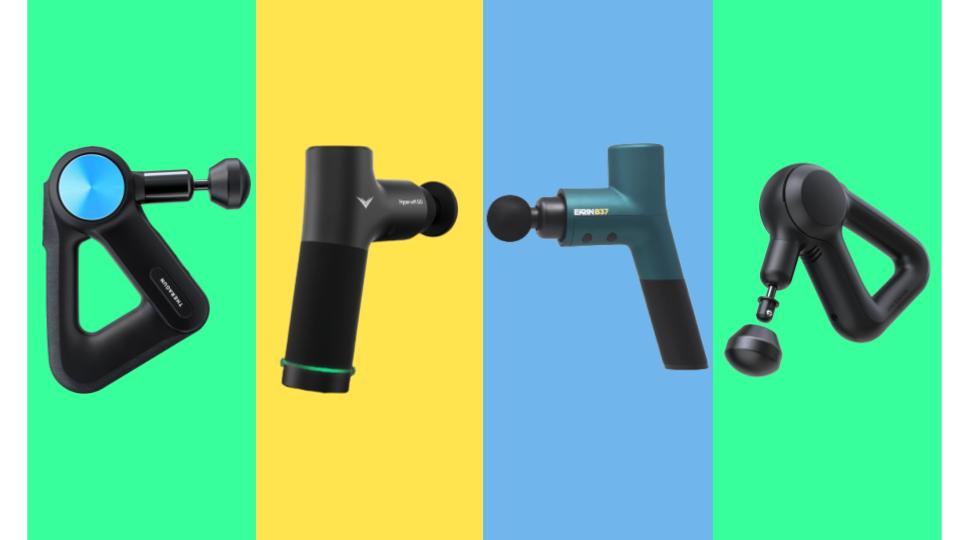
The best massage guns are powerful, quiet, and portable. Here are our top picks for percussive massage devices in 2021. Read more
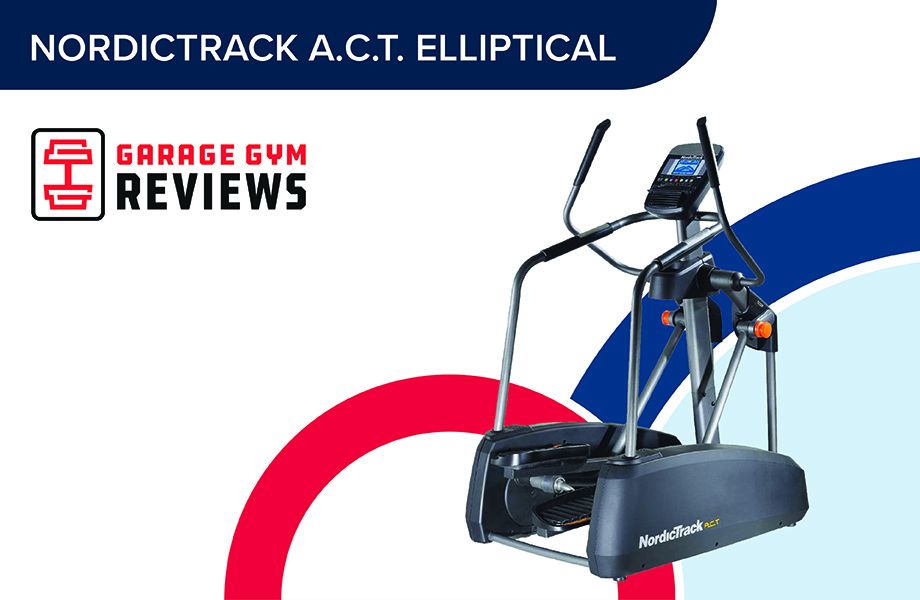
In our NordicTrack A.C.T. Elliptical review, we break down the specs of this machine and offer alternatives. Read more

